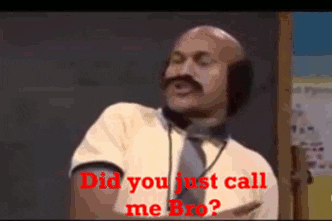- Decode with Adrija
- Posts
- Should You Try To Find Out Who’s Your Daddy?
Should You Try To Find Out Who’s Your Daddy?

Gif by CarlaDelaney on Giphy
For a while now, I have been sucked into the rabbit hole of Instagram reels and Reddit threads where people are having existential crises over their DNA results. One guy found out his biological father was actually his grandfather. Another discovered a secret sibling, hidden away for decades. Someone even got a call from the police because their DNA matched a long-lost cousin who drowned in Lake Superior in 1991.
Fascinating, right? Well, there’s a big catch- the one we all know about but barely think about: Data privacy.
First things first. Most of these discoveries come from white Americans and Europeans. Their genetic databases are vast, which makes results more accurate and surprises more frequent. South Asians? Not so much. The data pool is still tiny, so results are often vague or inconclusive. But that’s slowly changing.
Take Bedatri, a culture writer in New York. She took a 23andMe test three years ago, mostly out of curiosity. “My cousin had taken the test about seven years ago, and that is what made me decide to take it too,” she told me. Over time, as more of her South Asian relatives tested, her results became more refined. But here’s where things get dicey—23andMe isn’t doing too well.
In 2023, 23andMe suffered a major data breach, exposing the genetic data of nearly 7 million users. Their stock tanked by 99%, and analysts predict the company could go under this year. If that happens, what happens to the DNA they’ve collected? No one knows.
When NPR asked 23andMe about this, they dodged the question. But here’s what we do know:
80% of customers opted in for their DNA to be used in medical research. (It is very, very important to read the fine print)
23andMe already has a deal with pharmaceutical giant GSK to use customer data to develop new drugs.
If the company is sold or liquidated, their vast DNA database could end up in the hands of whoever buys them—governments, insurers, tech giants, you name it.
Bedatri didn’t wait to find out. She deleted her data and the app from her phone.
But well, DNA testing isn’t just about family secrets—it’s also solving crimes.
Take Sweden’s infamous 2004 Linköping murders. A child and a woman were brutally killed in broad daylight, and despite finding DNA at the scene, police had no leads for 16 years. Then, in 2019, Swedish law allowed police to search commercial genealogy databases. Boom—within months, they had a suspect. There’s a Swedish language 4-part fictionalised drama on this true crime on Netflix.
This raises an important question: Should police have access to our DNA? The US has already used sites like GEDmatch to solve cold cases, including the Golden State Killer. But where do we draw the line? If law enforcement can access your genetic profile, who else can?
The Ethical Dilemma
Your DNA can reveal everything—from ancestry to health risks to hidden family members. But it can also be used against you.
Insurers could deny coverage if your DNA suggests a predisposition to disease.
Employers could use genetic data to screen applicants.
Governments could weaponise DNA in ways we can’t even imagine.
A Redditor put it bluntly: “Imagine if the Nazis had access to genetic databases.” It’s a chilling thought. And in countries without strong data protection laws, handing over your DNA is an even bigger risk.
So, should you take a DNA test? That’s up to you. Just know that once your genetic code is out there, you can’t take it back.
Curious to hear your thoughts—have you taken a test? Did you get any shocking results?
MESSAGE FROM OUR SPONSOR
Receive Honest News Today
Join over 4 million Americans who start their day with 1440 – your daily digest for unbiased, fact-centric news. From politics to sports, we cover it all by analyzing over 100 sources. Our concise, 5-minute read lands in your inbox each morning at no cost. Experience news without the noise; let 1440 help you make up your own mind. Sign up now and invite your friends and family to be part of the informed.
🔥What’s Trending?
AI StalkingA man cyberstalked a professor for seven years— that included using AI chatbots to impersonate the professor and invite men online to her home address for sex. Guardian has the horrific story. |
Trump vs Indian tech-brosThe H-1B visa programme, once a symbol of mobility for Indian Tech- Bros and a driver of growth for American corporations, has become a battlefield. Al Jazeera’s opinion piece explains why it is no surprise that the tenuous alignment between Indian professionals and Trump’s ‘America First’ movement is unravelling. |
 | Kumbh’s Viral GirlHave you seen the viral reels of Monalisa, a garland seller at Kumbh? Apparently, she has not got a role in a Bollywood film. Good outcome but it doesn’t change the fact that she was stalked, harassed and forced to leave the festival. Decode has a story on how content creators turned the 16-year-old into viral fodder. |
Films, CensoredFilmmakers and the CBFC have never had an easy relationship, but the post-2014 era has spawned an ecosystem of censorship in which the CBFC is just one element. Article 14 interviewed filmmakers and CBFC insiders who spoke of an atmosphere of fear and uncertainty, including right-wing Internet trolls—who are dictating terms both to the board and to filmmakers. |
Got a story to share or something interesting from your social media feed? Drop me a line, and I might highlight it in my next newsletter.
See you in your inbox, every other Wednesday at 12 pm!
Was this email forwarded to you? Subscribe




